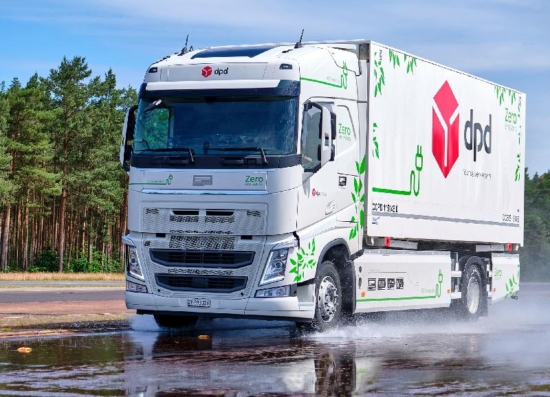Continental testing prototype tyres for electric trucks
 Continental strives to further increase tyre efficiency (Photo: Continental)
Continental strives to further increase tyre efficiency (Photo: Continental)
Electric propulsion is becoming increasingly attractive for heavy vehicle operators, and Continental is thus working together with truck and bus manufacturers on tyre solutions that meet these vehicles’ specific requirements. It is currently conducting testing at its Contidrom facility in northern Germany with an electric truck made by electric commercial vehicle specialist Futuricum.
The Futuricum truck, which DPD Switzerland has employed in regional traffic since March 2021, is based upon a Volvo FH and converted to an electric powertrain by Futuricum parent company Designwerk Products AG. The 19-tonne truck delivers 680 hp and, with a capacity of 680 kilowatt hours, carries the largest truck battery in Europe. This allows an unladen range of up to around 470 miles (760 kilometres).
Further increase efficiency
“The vehicle has been on the road in Swiss regional traffic since the beginning of the year and is currently rolling on tires of the Continental EcoRegional product line,” says Hinnerk Kaiser, Continental’s head of tyre development for truck and bus tyres. “The combination of Conti EcoRegional HS3 and HD3 already enables high mileage and extremely low rolling resistance and thus offers the essential characteristics for the economical operation of electrically powered commercial vehicles.”
The aim of the current series of tests is to increase efficiency even further, and Continental is placing a particular focus upon extending range by reducing rolling resistance. It is directly comparing the original tyres with the Conti EfficientPro as well as all-new prototype tyres.
Conti EfficientPro is a proven product specifically developed for long-distance transportation, with an emphasis on fuel efficiency. As for the abovementioned prototypes, Continental produced these at its tyre research and development facility in Hannover-Stöcken, Germany. It utilised robotics to carve the tread before handing the job over to experienced carvers who provided the finishing touches.
Race against time
“As with all electric drives, the tyres for the Futuricum Logistics 18E are exposed to higher torque during start off and acceleration,” explains Kaiser. “At the same time, the weight and weight distribution of the tractor are increased by the particularly powerful battery. Therefore, the tyres must not only have a low rolling resistance, but also withstand heavier loads than tyres for comparable vehicles with internal combustion engines. At the same time, they should last just as long and meet the same safety requirements as truck tyres for conventional drives.”
Balancing conflicting goals at an ever-higher level is technically demanding, a phenomenon that applies in particular to mileage, braking and handling performance. At the same time, in view of the e-mobility segment’s rapid development, Continental views its engineers as being in “a race against time.” It adds that the intention of developing concept tyres is to “significantly shorten the development time regardless of existing tyre generations.”
Swiss company Designwerk Products AG specialises in converting trucks and vans to electric drives. The range of products also includes mobile fast chargers and modular battery systems. The Futuricum Logistics 18E that DPD ordered at the beginning of 2021 is expected to drive at least 50,000 miles or 80,000 kilometres per year. Compared to comparable diesel-powered trucks, the electric truck saves 90 kilogrammes of CO2 per hundred kilometres – which corresponds to 72 tonnes of CO2 saved per year.


 Prometeon Tyre Group
Prometeon Tyre Group
Comments